

Avoidant Personality Disorder Treatment - Psych Central. By Psych Central StaffTable of Contents Psychotherapy As with most personality disorders, the treatment of choice is psychotherapy.
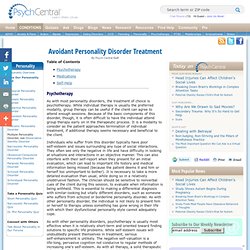
While individual therapy is usually the preferred modality, group therapy can be useful if the client can agree to attend enough sessions. Because of the basic components of this disorder, though, it is often difficult to have the individual attend group therapy early on in the therapeutic process. It is a modality to consider as the patient approaches termination of individual treatment, if additional therapy seems necessary and beneficial to the client. Individuals who suffer from this disorder typically have poor self-esteem and issues surrounding any type of social interactions. As with other personality disorders, psychotherapy is usually most effective when it is relatively short-term and oriented toward finding solutions to specific life problems. Medications Self-Help. Avoidant Personality Disorder Treatment Recommendations -Avoidant Personality Disorder-
In formulating guidelines for the treatment of avoidant personality disorder, it is important to bear in mind that this disorder shares many similarities with the Axis I disorder social phobia, as well as with agoraphobia.
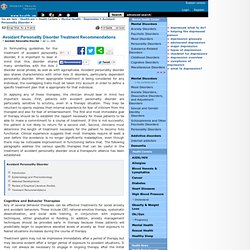
Avoidant personality disorder also shares characteristics with other Axis II disorders, particularly dependent personality disorder. When appropriate treatment is being considered for any individual, the overlapping traits must be taken into account in order to define a specific treatment plan that is appropriate for that individual. In applying any of these therapies, the clinician should bear in mind two important issues. First, patients with avoidant personality disorder are particularly sensitive to scrutiny, even in a therapy situation. They may be reluctant to openly express their internal experience for fear of criticism from the therapist and also for fear of embarrassment. The well-tolerated anticonvulsant gabapentin also may be useful. 0Digg 0Delicious.
Avoidant Personality Disorder - Psych Central. People with avoidant personality disorder experience long-standing feelings of inadequacy and are extremely sensitive to what others think about them.
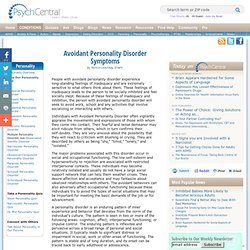
These feelings of inadequacy leads to the person to be socially inhibited and feel socially inept. Because of these feelings of inadequacy and inhibition, the person with avoidant personality disorder will seek to avoid work, school and any activities that involve socializing or interacting with others. Individuals with Avoidant Personality Disorder often vigilantly appraise the movements and expressions of those with whom they come into contact. Their fearful and tense demeanor may elicit ridicule from others, which in turn confirms their self-doubts. They are very anxious about the possibility that they will react to criticism with blushing or crying. The major problems associated with this disorder occur in social and occupational functioning. Avoidant Personality Disorder. Prevalence The prevalence of avoidant personality disorder is about 2.4% of the general population.
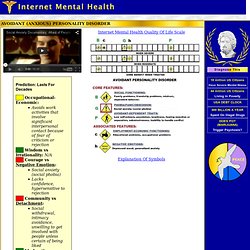
Course The course of avoidant personality disorder is chronic. This disorder is usually worse earlier in life and often improves in middle age. This disorder is equally frequent in males and females. Complications Individuals with avoidant personality disorder have few close friends, but are very dependent on them. Comorbidity Personality disorders are an overlooked and underappreciated source of psychiatric morbidity.
Avoidant Personality Disorder Home ( AvPD ) Avoidant personality disorder. Avoidant personality disorder (AvPD), also known as anxious personality disorder,[1] is a Cluster C personality disorder recognized in the Diagnostic and Statistical Manual of Mental Disorders handbook as afflicting persons when they display a pervasive pattern of social inhibition, feelings of inadequacy, extreme sensitivity to negative evaluation, and avoidance of social interaction.[2] Individuals afflicted with the disorder tend to describe themselves as ill at ease, anxious, lonely, and generally feel unwanted and isolated from others.[3] People with avoidant personality disorder often consider themselves to be socially inept or personally unappealing and avoid social interaction for fear of being ridiculed, humiliated, rejected, or disliked.
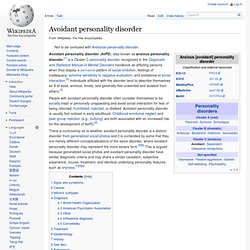
Avoidant personality disorder is usually first noticed in early adulthood. Childhood emotional neglect and peer group rejection (e.g., bullying) are both associated with an increased risk for the development of AvPD.[4] Signs and symptoms[edit] Avoidant personality disorder - PubMed Health.